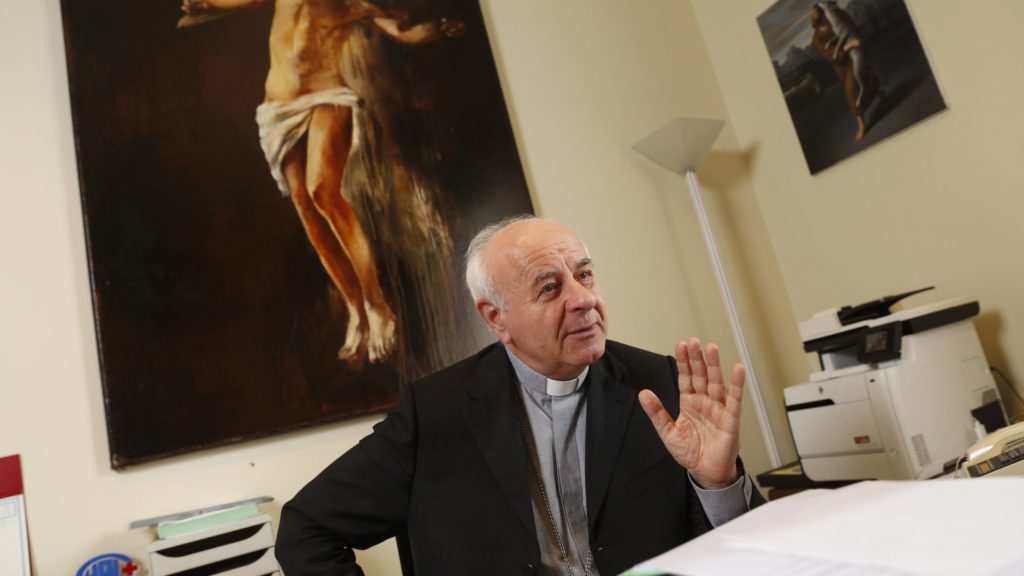Archbishop Vincenzo Paglia, president of the Pontifical Academy for Life, has sparked a firestorm of reaction since appearing to suggest that he supports legalizing physician-assisted killing in certain circumstances.
The blowback to the Italian prelate’s words was understandable, given the energy and effort many of us have spent fighting this evil, especially on behalf of those with disabilities.
There have been some losses, such as in California, but just last week deep blue Connecticut fended off PAK for yet another year. David Albert Jones, who has been a leader in the successful ongoing resistance to PAK in the United Kingdom, believes Paglia’s words will have consequences in these battles and may even “cost lives.”
During a speech delivered at a journalism conference in Italy, Paglia brought up the ongoing legal and political battle over a court decision that ruled blanket prohibitions of physician-assisted killing are unconstitutional. Here is an English translation of the remarks in question:
In this context, it cannot be excluded that in our society a legal mediation is feasible which allows assisted suicide in the conditions specified by the Constitutional Court 's Judgment 242/2019: the person must be “kept alive by life support treatments and affected by an irreversible pathology, a source of physical or psychological suffering that she deems intolerable, but fully capable of making free and informed decisions.”… Personally I would not practice assisted suicide, but I understand that legal mediation can constitute the greatest common good that is concretely possible in the conditions in which we find ourselves.
Such language is open to different interpretations.
First interpretation: Though the Pontifical Academy for Life attempted to clarify that these remarks are “in full conformity with the church’s magisterium,” the academy under Paglia’s leadership has moved to develop the Church’s moral theology in ways that challenge the very idea of a strict prohibition or exceptionless moral norm. Though much attention has been paid to contraception in this regard, there have been explicit calls within Paglia’s Academy to revisit the idea of care for the sick and disabled as understood in the Church’s teaching in Samaritanus Bonus, a 2020 Vatican document on care for the terminally ill.
This interpretation benefits from the opening lines of Paglia’s talk in which he says that “the Catholic Church does not have a package of ‘prêt-à-porter’ [‘ready to wear’] truths, prepackaged, as if it were a dispenser of pills of truth.”
He is at pains to emphasize, right from the beginning of his remarks, that the Church has much to learn from the culture and that the Church’s teaching develops in a dialogue of mutual enrichment. This points to an ongoing attempt to move the Church’s teaching away from the idea that it is always wrong to aim at the death of an innocent person — of which physician-assisted killing is an increasingly popular example — and listen to the “experiences” of those in the broader culture with quite different perspectives.
An alternative interpretation focuses on Paglia’s loyalty to Pope Francis and the fact that he is speaking into a very particular Italian context.
The Holy Father, of course, has been an outspoken critic of movements in Europe to legalize physician-assisted killing as examples of throwaway culture, arguing that the norm against it “applies to everyone, not just Christians or believers.” For Francis, the stakes in these legal battles could not be higher: “The dignity of human life is at stake. The dignity of the medical vocation is at stake.”
Furthermore, while the Holy Father has tried to incorporate a new balance on life issues, he is quite comfortable teaching exceptionless moral norms.
As an example, though a previous version of the Catechism allowed for exceptions (though “very rare, if practically nonexistent”) in which the death penalty could be administered, Francis moved to change Church teaching such that “the death penalty is inadmissible” and the Church “works with determination for its abolition worldwide.”
It is also unlikely that Paglia wishes to undermine the Church’s teaching that acts like torture and sexual violence are always and without exception wrong. On this interpretation, he is focused instead on making a difficult prudential judgment about a very particular situation in Italy. With the court there insisting that some PAK must be legal, there is a case to be made for voting for more restrictive law in order to avoid a worse law.
Making this kind of prudential judgment about policy is very much in line with Catholic teaching. Indeed, St. Pope John Paul II’s 1995 encyclical, “Evangelium Vitae” (“The Gospel of Life”) explicitly allows for supporting certain laws that permit some abortion in order to avoid worse laws that permit much more abortion, for instance.
But Albert Jones is right to worry about the extreme dangers of opening the door to PAK. Small exceptions often grow into general acceptance. Common sense safeguards give way to individual autonomy and freedom.
Unintended consequences are the norm — especially when it comes to structurally coercing the disabled and of the economically vulnerable into ‘choosing’ PAK. One need look no further than Canada over the last couple of years to see this horrific dynamic in action.
So, even if one takes the second interpretation of Paglia’s words, the Church should follow Albert Jones’ instance that we be 100% clear that “every suicide, whether assisted or unassisted, is a tragedy.”

